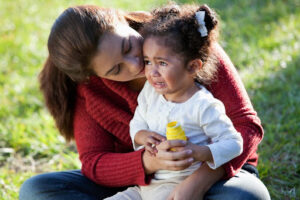
Image description: A cute little two year old hispanic girl crying, sitting in her mother’s lap. Mom is holding her, trying to comfort her. They are sitting on the grass outdoors.
What a crazy past two years this has been for everyone! With all of this unpredictability and change, your child may be experiencing some big feelings at home. If this is the case, we are here to help! Below, you can find some tips on how to empathize with your child during feelings of frustration, anger or sadness. These moments can be very challenging for primary caregivers and other caretakers, especially when additional stressors are present. Experts from the field of Clinical Psychology and Psychiatry have provided essential information to help us support both young children and adolescents through heightened emotions. These tips are short, simple and straightforward!
With the following tips:
- You can empathize with your child
- Your child will be more likely to regulate and calm
- Your relationship with your child will be strengthened
- Your child will learn how to empathize with others
TIPS: When your child is upset or dysregulated:
- Make sure that you are calm, regulated and ready to connect with your child
- Instead of reacting, chase the why. (Why is my child behaving/feeling this way?) Asking ourselves this question helps us empathize with our children, even when we don’t like their behavior or response.
- Remind yourself that children always want to do well. When they are acting unexpectedly, it may be because they need support in certain skill areas in order to appropriately manage their thoughts, emotions and behavioral responses.
- Think about these moments as opportunities to promote and support your child’s social emotional development and growth.
- Connect with your child – kneel down, provide eye contact and offer a gentle touch.
- Listen to your child – demonstrate your willingness to listen and avoid lecturing at this time.
- Understand – demonstrate that you understand what your child is feeling. You can do this by rephrasing what your child is saying (e.g. “You are mad because your sister does not want to play”), describing what you are observing (e.g. “You look really upset”) and providing an empathetic statement (e.g. “I know, it is really frustrating to wait when your sister is not ready”).
- Accept your child’s feelings – avoid arguing and dismissing your child’s feelings.
- Identify with their feelings – you can share your personal experiences with that certain feeling (e.g. I have felt a similar way before when I lost my car keys”).
- Caring about their feelings – you can verbalize in the moment how much you care for them and their feelings (e.g., “I am sad that you feel sad”).
Empathy creates safety, provides affirmation, and leads to healing!
Questions or Concerns?
If you have questions or concerns about your child’s emotional regulation and behavioral responses, please contact us at info@playworkschicago.com or 773-332-9439.
Silvia Castillo, MSW, LSW
Licensed Social Worker
References:
Greene, R. (1998, 2014). The Explosive Child. New York, NY: HarperCollins
Siegel, D., Payne Bryson, T. (2016). No Drama Discipline: The Whole-Brain Way to Calm the Chaos and Nurture Your Child’s Developing Mind. Random House Publishing Group.’
John F. Taylor & Summit Professional Education (2014). Seminar: High Impact Strategies for Oppositional, Uncooperative and Aggressive Behavior: Transforming Defiance into Cooperation in Children and Teens.
Photo Credit: Ahaparenting.com
